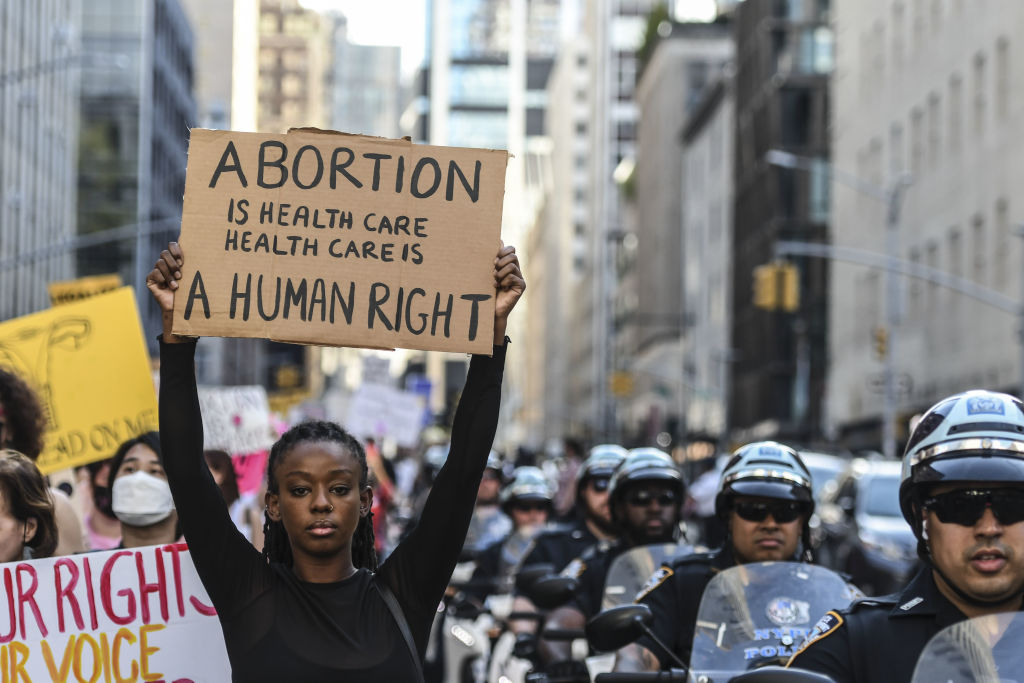DSCC Deputy Shares Personal Story On Maternal Health
‘My Own Story Is One Of Survival’: DSCC Deputy Gets Personal In New Video Connecting Abortion Restrictions And Maternal Health Outcomes

Source: Shannon Finney / Getty
A week after the leaked Supreme Court draft opinion in Dobbs v. Jackson Women’s Health Organization made waves, and communities are still processing the impact of a decision that is likely to end abortion access as it exists today. While the official SCOTUS decision has yet to be released, groups around the country continue to ramp up efforts to increase abortion access and expand support for various reproductive health measures.
And for some people fighting to protect and expand reproductive health and abortion includes increasing Democratic control of the Senate to ensure the passage of legislation that would codify the right to have an abortion. In a new video, Jessica Knight-Henry, deputy executive director at the Democratic Senatorial Campaign Committee (DSCC), draws a connection between abortion bans and increased restrictions on maternal health outcomes.
“States with more abortion restrictions have higher rates of maternal and infant mortality, which disproportionately affects Black women and their families,” Knight-Henry began. “Black women are three times more likely to die from pregnancy-related causes, and overturning Roe will only worsen this crisis. My own story is one of survival. And I know I’m one of the lucky ones. That I’m not another Black maternal mortality statistic.”
An August 2021 study from Tulane documented the relationship between abortion restrictions and higher maternal mortality rates. Sharing her personal story, Knight-Henry explained that she had postpartum symptoms of heart palpitations that her physician ignored until it was almost too late.
“A few months after giving birth and returning to the workforce, I went to my doctor and expressed concerns because I was having severe symptoms and heart palpitations. I was told I was overreacting,” Knight-Henry shared. “Three months later, I underwent my first of two heart procedures after being diagnosed with pregnancy-induced heart failure.”
A study released in December 2020 found that Black pregnant women were still significantly more likely to have heart-related complications during pregnancy when compared to white women, even when controlling for economic status. Some of the findings observed that pregnant Black women were 57 percent more likely to have a stroke, 45 percent more likely to die in a hospital and 42 percent more likely to develop a blood clot in the lungs.
According to the American Heart Association Stroke, heart disease is a top ten cause of death for pregnant women 20-44. In a heart health fact sheet, the association noted that less than 50% of pregnant women have good heart health at the start of their pregnancies.
Before joining the DSCC, Knight-Henry served as a national development director for Supermajority, an organization committed to pooling the power of women as voters and grassroots leaders to move the country forward in a way that benefits everyone and not a select few. Knight-Henry told NewsOne that this fight is personal to her.
“I was nearly another Black maternal mortality statistic, and my own story isn’t unique: banning abortion and restricting access to health care services will have especially dire consequences for Black women and women of color across our country,” Knight-Henry said. “Voters know that the stakes of this election have never been higher. Senate Republicans have spent months campaigning on overturning Roe v. Wade – and the November election will now determine whether the GOP will be able to impose cruel new punishments and restrictions on women.”
Abortion restrictions and limited access to obstetrical and gynecological care in many counties exacerbate maternal health outcomes for many across the country. And for those in rural areas, the situation is even more dire when hospital closures are factored in.
An analysis from the Center for Reproductive Rights provides a side-by-side comparison of restrictions by state with the supportive policies for maternal health. The data shows this is a time for expanding access to reproductive care, including abortion, not restricting or eliminating it.
Some of the change needed to bring approaches to reproductive health services in line with the reality of people’s experiences is at the state level. But Knight-Henry suggests expanding Senate Democratic control will ensure passage of necessary federal legislation such as the Women’s Health Protection Act.
Research also shows that 60 percent of maternal deaths are preventable, suggesting the focus of legislation at the state and federal levels should be on expanding reproductive health, not restricting it. Recently, Tufts University launched a Black Maternal Health Center.
Knight-Henry shared that voters can prioritize reproductive health by supporting Democratic candidates running for Senate in upcoming elections.
“Voters will stand with Democrats to protect and expand our Senate majority and keep these intimate, personal health care decisions between a woman and her doctor,” she said.
Watch the full video below:
SEE ALSO:
Tufts Opens New Black Maternal Health Center To Address Birthing Disparities



















